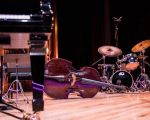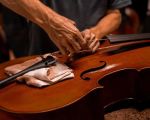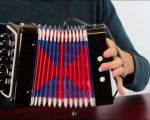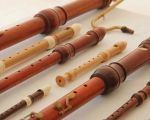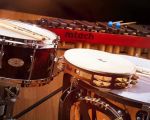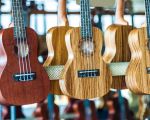What Musical Instrument Did Duke Ellington Play? A Deep Dive into His Musical Genius
Duke Ellington is widely regarded as one of the most important figures in the history of jazz music. His music transcended the boundaries of jazz, taking it into new realms and blending various genres. But while many know of Ellington’s impact, there remains a question that intrigues both music enthusiasts and those new to his work: What musical instrument did Duke Ellington play? Let's take a closer look at this fascinating question and explore Ellington's multifaceted talents.
1. Duke Ellington: The Pianist Who Redefined Jazz
Before we dive into the specific instrument Ellington played, it’s essential to understand his background. Born in 1899 in Washington, D.C., Ellington's musical talents began to emerge at a young age. He started learning the piano as a child and showed a remarkable aptitude for the instrument, often performing in local clubs. His early exposure to music, along with his innate understanding of melody and harmony, laid the foundation for his future as a composer and bandleader.
The Piano: Ellington’s First Love
The piano was, without a doubt, Ellington’s primary instrument. He played it with exceptional skill, and it became the vehicle through which he expressed his musical ideas. Many of Ellington’s compositions were crafted with the piano in mind, showcasing intricate melodies and harmonies that would later become his signature sound. His playing was marked by a deep sense of rhythm and improvisation, traits that would influence generations of musicians after him.
2. A Master Composer and Bandleader
Although Ellington was known for his piano playing, his true genius extended beyond his role as a pianist. He was also a visionary composer and arranger who was responsible for some of the most iconic pieces in jazz history. His compositions, such as "Mood Indigo," "Take the A Train," and "In a Sentimental Mood," are still celebrated today for their innovation and complexity. Ellington's ability to compose for big bands, while maintaining a unique and personal voice, was a testament to his incredible musicality.
Ellington's Leadership in Jazz Orchestration
As a bandleader, Ellington revolutionized jazz orchestration. He understood the nuances of different instruments and how to blend them harmoniously. This ability to lead and arrange music for large ensembles made him a key figure in shaping the direction of jazz during the 20th century. His orchestra, which played at the Cotton Club and later toured around the world, became a symbol of musical excellence and innovation.
3. The Evolution of Ellington's Piano Style
Ellington’s piano playing evolved significantly throughout his career. Early in his life, he was heavily influenced by the ragtime and blues traditions, which gave his playing a rhythmic pulse and an earthy quality. However, as he matured as a composer and bandleader, his piano style began to reflect the sophistication of jazz as a genre, incorporating elements of classical music, swing, and improvisation. His later piano work became more expansive and experimental, allowing him to create complex harmonic textures that were ahead of his time.
Innovative Techniques in His Piano Playing
Ellington's piano style was distinctive for its use of unconventional harmonies and rhythmic patterns. He often used chromaticism and dissonance in his compositions, which helped shape the sound of modern jazz. His improvisational techniques were also notable. He would often explore new harmonic structures and rhythmic patterns on the spot, pushing the boundaries of what was considered possible within jazz at the time.
4. Ellington’s Influence on Other Musicians
Duke Ellington’s impact on other musicians cannot be overstated. His innovative approach to piano playing, composition, and orchestration influenced countless jazz musicians, including Thelonious Monk, Charles Mingus, and Miles Davis. These artists were inspired by Ellington’s ability to blend genres and express complex emotions through music. As a result, Ellington’s legacy continues to inspire musicians across various genres, even to this day.
Ellington’s Role in Shaping Jazz as an Art Form
Ellington's work was instrumental in elevating jazz from a popular entertainment form to a legitimate art form. His compositions demonstrated that jazz could be sophisticated and serious while still maintaining its essential spirit of improvisation. His contributions to jazz orchestration and his ability to craft intricate arrangements made him a pioneer in the field of jazz composition. His legacy continues to be celebrated by jazz aficionados and musicians alike.
5. The Answer to the Question: What Musical Instrument Did Duke Ellington Play?
While Duke Ellington was undoubtedly a brilliant composer and bandleader, the answer to the question is simple: Duke Ellington was a pianist. The piano was his primary instrument, and it played a central role in his musical expression. He used the piano to compose his legendary works, and his performances on the instrument were a key element of his success as a musician. His unique blend of technical skill, improvisation, and deep musical understanding made him one of the greatest pianists in jazz history.
Ellington’s Piano Legacy
Ellington’s piano playing was not just about technique; it was about emotion and storytelling. His ability to evoke powerful feelings through his music, combined with his creative improvisation, made him a truly unique talent. Even though he played other instruments in his compositions, it was his piano that defined his style and brought his music to life.
In conclusion, Duke Ellington’s role in jazz history is multifaceted, but it all started with the piano. His influence on jazz and popular music continues to be felt, and his contributions to the art form are undeniable. Whether you’re a fan of jazz, classical music, or just a lover of great music, Ellington’s legacy is one that will continue to inspire musicians for generations to come.
SEO Title: What Musical Instrument Did Duke Ellington Play?
SEO Keywords: Duke Ellington, musical instrument, jazz piano, Duke Ellington's influence, best jazz pianists
SEO Description: Discover the musical instrument that Duke Ellington played and learn about his legacy as a jazz pianist and composer. Explore his contributions to jazz and his impact on modern music.


